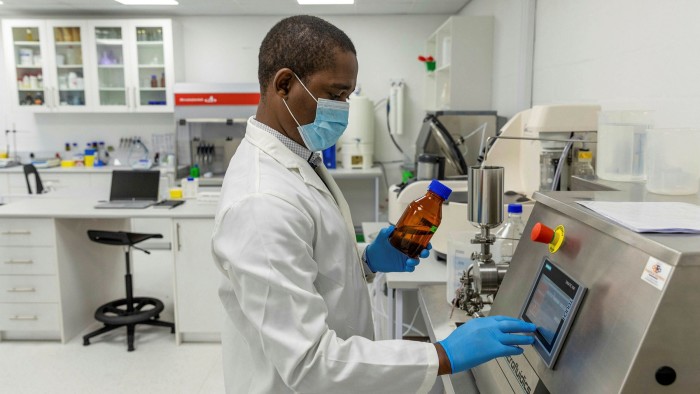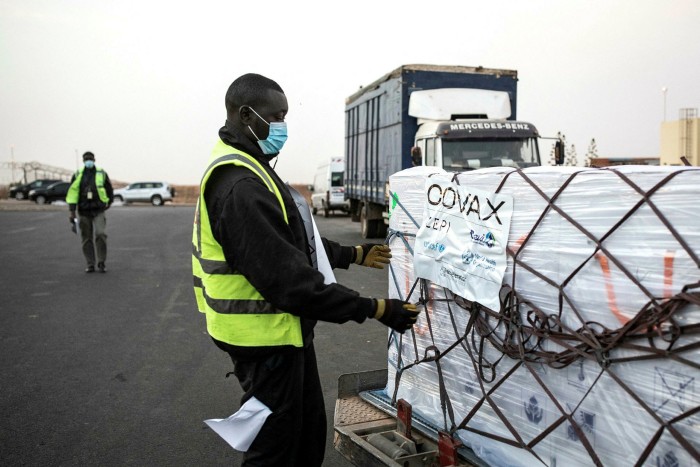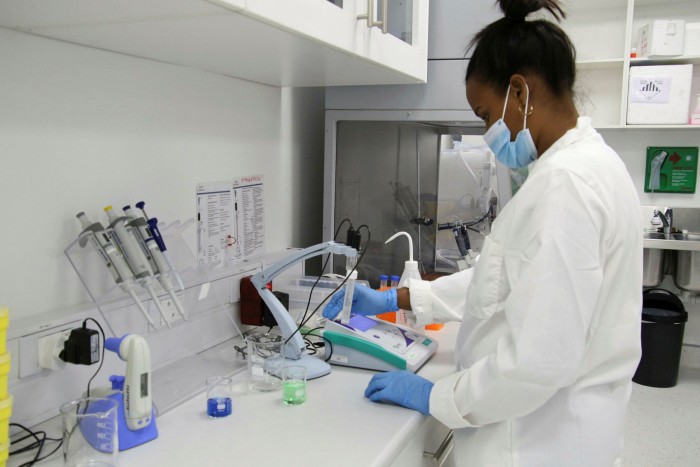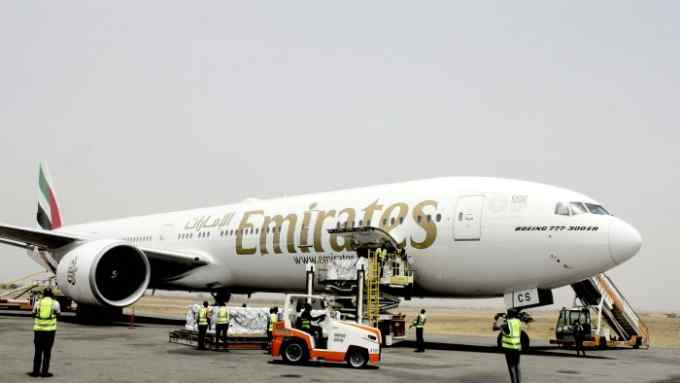Covid disappointments spur Africa’s homegrown vaccine makers

Roula Khalaf, Editor of the FT, selects her favourite stories in this weekly newsletter.
If all had gone to plan, a 10th of Africans would have been fully vaccinated by the end of last September, rising to 40 per cent by the end of the year and bringing a goal of 70 per cent by mid-2022 within reach.
Instead, 20 of Africa’s 54 countries — including Nigeria and Ethiopia, the two most populous nations — have not even reached the September target, which was set by the World Health Organization.
African countries had hoped the Covax vaccine-sharing scheme would guarantee them timely access to jabs, but a lack of regional vaccine production and a bidding war with richer, western nations meant much of the continent has been last in line for doses.
According to the FT’s vaccine tracker, 73 per cent of EU residents have been fully vaccinated against Covid, compared with 13 per cent in Africa.
Health authorities and scientific institutions in Africa have now set themselves a different target. By 2040 they want 60 per cent of all vaccines given on the continent to be manufactured in Africa, up from 1 per cent now.
“We learnt our lessons the hard way, but there is finally momentum building towards manufacturing more vaccines for Africa, in Africa,” says Nicaise Ndembi, chief science adviser at the Africa Centres for Disease Control and Prevention, the body behind the 2040 target.

The drive to build homegrown manufacturing capacity — not just for vaccines but also for diagnostics and therapeutics — is essential to ensure Africa is better placed to respond to the next pandemic, experts say.
Ndembi says self-sufficiency in production would prevent African countries being “left behind” as countries compete for pandemic countermeasures in response to future pathogens.
At the onset of the Covid pandemic, there were just four African countries with vaccine manufacturing capacity: South Africa, Egypt, Senegal and Tunisia. Now, there are 15 African nations with vaccine manufacturing projects in the works, according to Ndembi.
“We’re out of the starting blocks now but we still have a distance to go,” says Patrick Tippoo, executive director of the Africa Vaccine Manufacturing Initiative. “Prior to the pandemic . . . we weren’t even in the starting blocks.”
Last month, Afrigen Biologics and Vaccines, a Cape Town-based biotech, announced that it had successfully reproduced Moderna’s mRNA vaccine almost entirely from scratch. The biotech plans to share its technique with five other African countries as part of the WHO’s mRNA vaccine technology transfer hub.

BioNTech, the German company which collaborated with Pfizer on the western world’s most popular jab, is also preparing to send shipping containers that have been adapted as vaccine production facilities to Senegal, Rwanda and South Africa. They should be operational by next year.
“Whenever there’s a crisis, there are always difficulties with great demand outstripping limited supply,” says Joe Fitchett, director of the delivery unit at the Dakar-based Pasteur Institute, which is collaborating with BioNTech on the Senegal facility.
“We can’t eliminate that dynamic but we can be better prepared: we can have more security of supply, more decentralised supply, shorter supply chains,” he adds.
But Tippoo cautions that sustaining the projects may prove more difficult than getting them off the ground. “This needs to go far beyond Covid,” he says. “You need a system that allows for the production of routine vaccines and is therefore commercially viable.”
“You need people, skills, infrastructure, equipment, practice in the technology — an ecosystem of capability and of competence,” he adds.
Hence, the target of having 60 per cent Africa-made vaccines encompasses a wide array of vaccines for more than 20 diseases — including routine jabs for human papillomavirus and measles, and even HIV or malaria shots if they make it through clinical trials.
However, Charles Gore, executive director of the Medicines Patent Pool, a United Nations-backed initiative for developing medicines in low- and middle-income countries, believes African ownership is also key. “If the control remains in Europe, the fact that the manufacturing is in Africa is irrelevant,” he says.
Last summer, for example, Johnson & Johnson came under fire for shipping millions of doses that had been bottled and packaged at Aspen Pharmacare in South Africa to Europe. At the time, more than half of EU citizens were double-vaccinated, compared with just two per cent of Africans.
J&J eventually pledged to prioritise African countries for the doses produced by the Aspen facility, but Gore says this represents a “cautionary tale”.
Tippoo says the Aspen facility controversy showed that African manufacturing facilities need not only to be able to package vaccines but also to make the vaccine substance itself, as well as having research and development expertise.
Yet the aim of building manufacturing capacity has proved elusive in the past. “Efforts to boost pharmaceutical production [in Africa] are not new,” points out Fitchett, citing a WHO report on the topic from 2009. But he adds: “It certainly has, now, a real opportunity about it to develop the systems, develop manufacturing in a meaningful way, but a lot more work is needed.”
“In order to break the cycle of dependency, we need to remove every layer of dependency,” says Tippoo. “You need to take the vaccine from conception to bottling — then you’re in the space where you have control over your own destiny.”

Comments